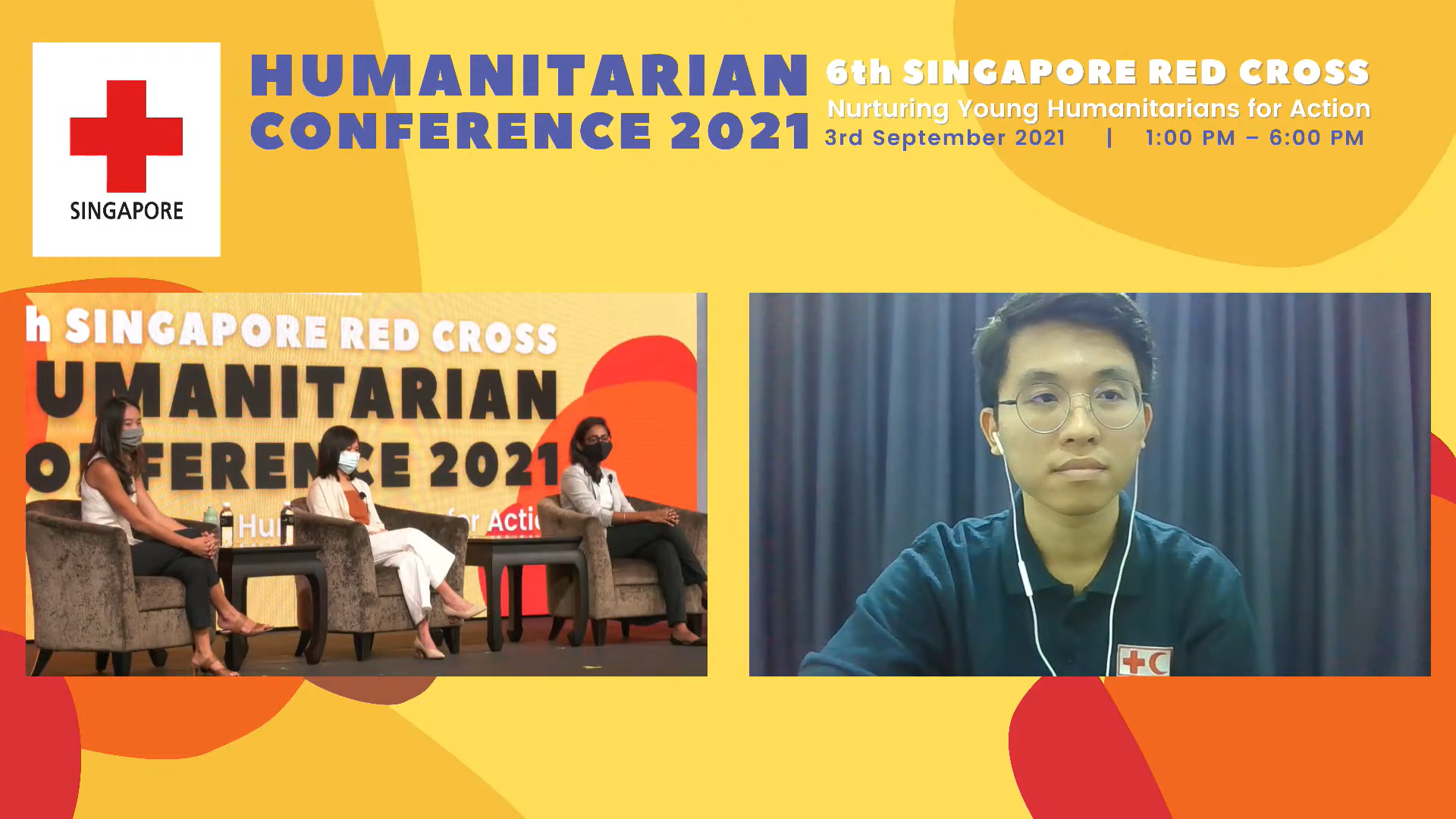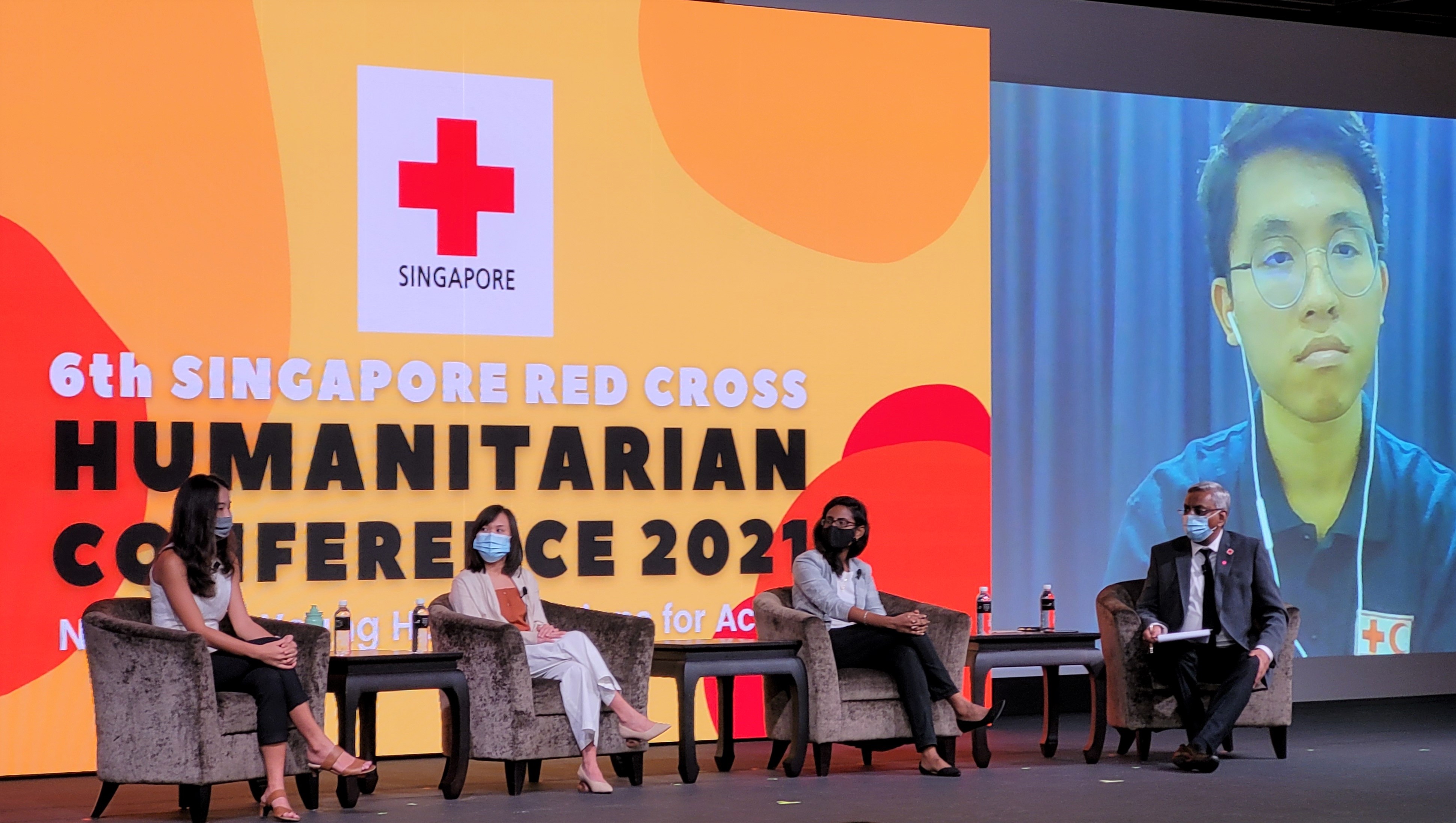
The 6th Singapore Red Cross Humanitarian Conference was streamed live from Marina Bay Sands on 3 September 2021, to over 200 participants from around the world.
Themed 'Nurturing Young Humanitarians for Action' the hybrid event brought together speakers from diverse backgrounds, with the shared purpose of inspiring the younger generation to step forth and be the catalyst for a positive change.
In his keynote speech, Guest-of-Honour Mr Ong Ye Kung, Minister for Health, observed that the top three issues raised by students in his years of interaction with them were social inequality, mental health, and climate change.
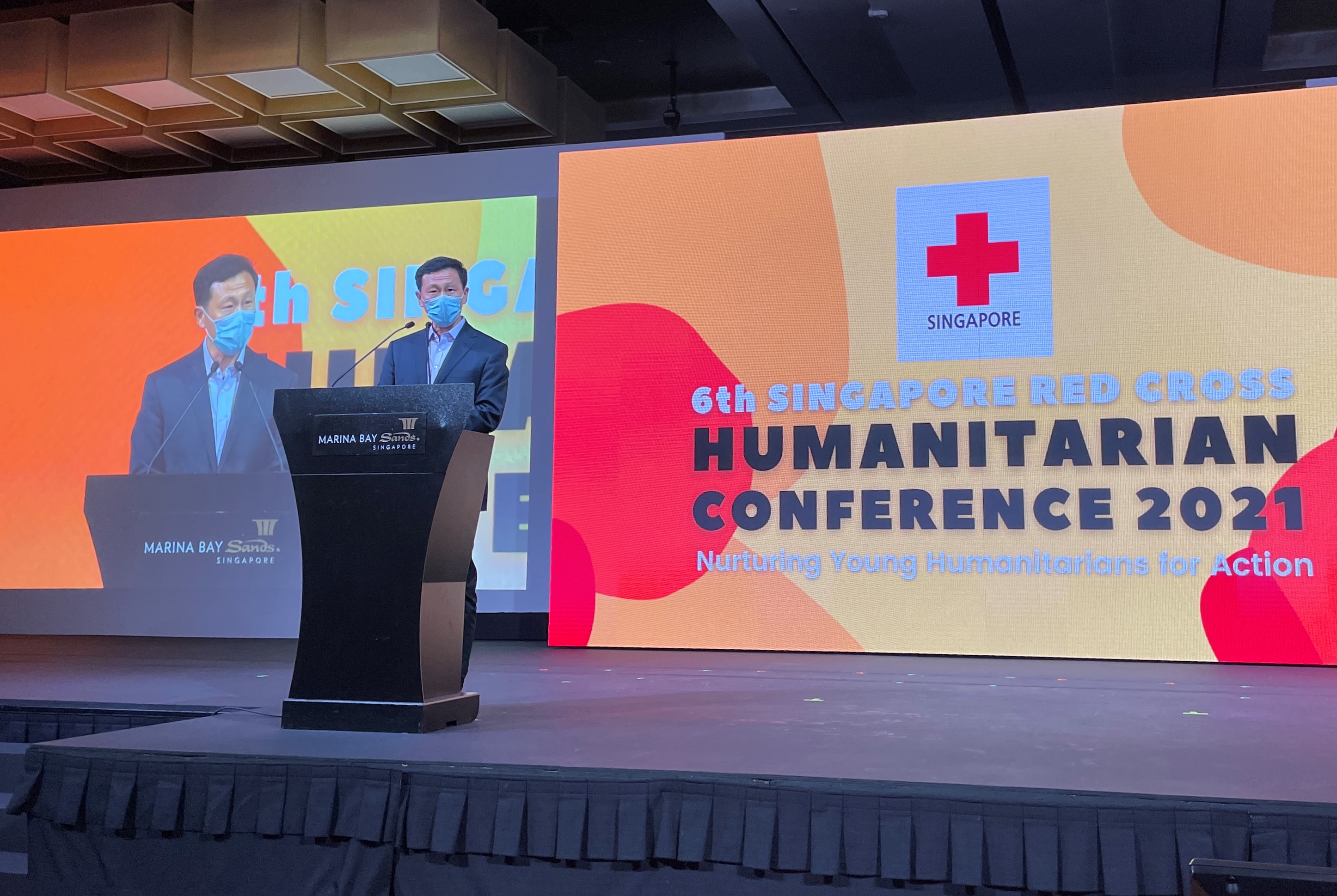
Social Inequality
Minister Ong noted that social inequality is a challenge in many societies, most notably in terms of the income gap. To address this issue, he highlighted that the tripartite partners - the Union, employers and Government have been working to ensure inclusive growth to benefit all. Collectively, they implemented SkillsFuture, Progressive Wage System, Workfare Income Supplement Scheme, and put in place high-quality public infrastructure, education and support schemes for children, including KidSTART by MSF in preschools, Learning Support Programme in primary schools and the UPLIFT programme, which supports students from disadvantaged families by enhancing after-school care support and deepening partnership with the community.
Mental Health
He noted that intensified competition due to globalisation, and heightened pressure from family, peers and oneself personally had stoked stress among the youth. Social media has also spawned peer comparison, validation seeking, herd instincts, and more incidences of cyberbullying. Minister shared that globalisation and technology dominate a young person’s life, but it does not mean that they are worse-off than previous generations. On the contrary, technology and globalisation offer tremendous opportunities, hope and optimism, and provide extensive knowledge at one's fingertips. With a different growing up experience, it will hence be useful to equip youth with the necessary life skills to cope with new pressures in modern society while ensuring the safe and healthy adoption of digital technology. On this note, the Ministry of Education's new Character and Citizenship Education curriculum focussed on developing mental health literacy, social-emotional skills and resilience building in students. Schools have been incorporating digital literacy into their curriculum for all students. What is also being looked into is to build a stronger support network comprising teachers, counsellors and peers in schools and educational institutions to look out for one another while making efforts to destigmatise mental illnesses. A new Interagency Taskforce on Mental Health and Well-Being (ITFMHW), chaired by Senior Minister of State Dr Janil Puthucheary, has been established to delve into these issues.
Climate Change
Minister Ong noted that global warming effects can be felt as early as 2050 or earlier. As Singapore is a low-lying island, she is very vulnerable to the impact of climate change. He highlighted that for decades, Singapore has put in place environmental policies that were quite ahead of time; setting aside 30 per cent of land for nature reserves, building a garden city, implemented taxes to ease vehicle congestion; shifting out of coal-powered energy, and imposing a carbon tax on almost all economic activities.
He shared that the government unveiled the Singapore Green Plan 2030 in February this year comprising a five-pronged approach 'City in Nature', 'Energy Reset', 'Sustainable Living', 'Green Economy', and 'Resilient Future'. Though Minister Ong noted that the Green Plan itself may not make a large impact in the grand scheme of things in global warming as Singapore contributes to 0.1 per cent of global carbon emissions, he underscored that Singapore can be a catalyst for global change and be a key reference point for other cities around the world, which will be something that we will be proud of.
Singapore Green Plan 2030
| Approach | Target |
| City in Nature | Target to increase the land area of nature parks by over 50 per cent and plant one million more trees by 2030 |
| Energy Reset | Enhance the deployment of solar energy while leveraging green energy sources from ASEAN and beyond, and converting vehicles to run on electricity. |
| Sustainable Living | Reduce waste sent to landfills, repurpose roads to encourage walking and cycling, and include sustainability as part of the educational curriculum. |
| Green Economy | Ensure sustainability can be a major contributor to our capabilities, growth, and dynamism. |
| Resilient Future | Moderate the rise in urban heat and build physical defences to protect our coastlines against rising sea levels. |
Galvanising Youth into Taking Action
Minister Ong also noted that the youth of today are naturally keen to play a part in deriving solutions to resolve today's challenges. Minister Ong underscored that there is a need to create receptacles and platforms to facilitate youth to take action. He pointed out that the National Youth Council initiated the Youth Action Challenge in 2020 to translate ideas into action. Minister Ong highlighted a few initiatives under the Youth Action Challenge such as Team Urban Community Farm aimed at transforming community spaces into urban farms, and Scratchbac aimed at sharing resources in local communities to help vulnerable groups in the neighbourhoods. In the same spirit, the Red Cross Movement's One Billion Coalition for Resilience launched in 2014, was also targeted at rallying people together to address humanitarian problems such as natural disasters and famine. He emphasised that youths can also make a difference individually by volunteering at grassroots organisations, religious institutions, voluntary welfare organisations or self-help groups.
Youth - A Formidable Force for Social Change
Ms Tan Poh Hong, Vice Chairman of the Singapore Red Cross (SRC) gave the background of the Singapore Red Cross Humanitarian Conference, which was launched in 2015 as a platform to bring together like-minded humanitarian actors from various organisations, to share useful insights and discuss humanitarian trends and challenges facing the world today. Over the years, SRC organised humanitarian conferences that brought people globally from all walks and ages, to discuss important topics such as health, green disaster response, migration, and partnership and volunteerism.
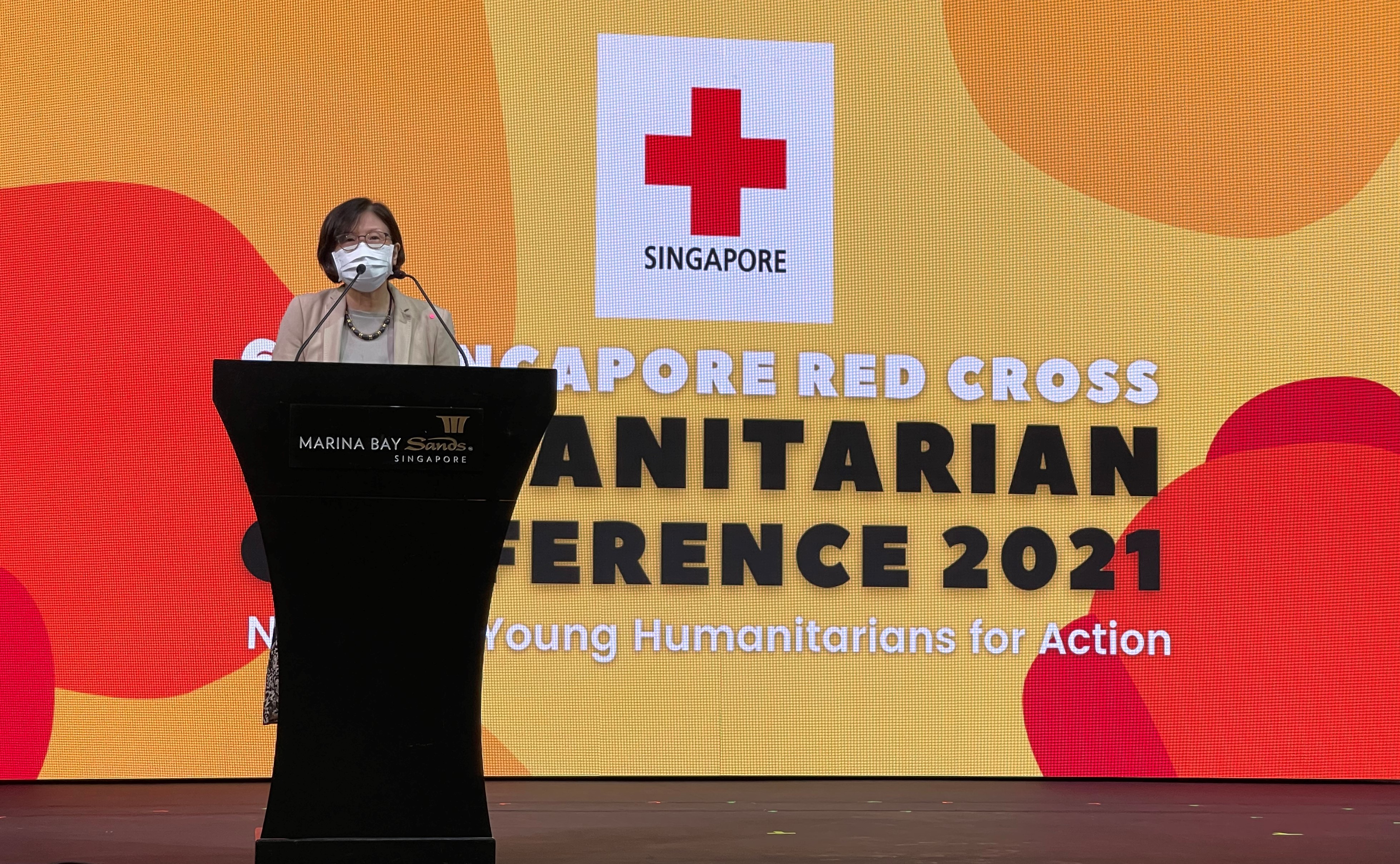
Ms Tan proudly recounted examples of Red Cross Youth stepping up to make a difference in the lives of people and communities affected by the pandemic, as the humanitarian organisation remained “unmuted” and undeterred in the face of constant challenges posed by the COVID-19 pandemic:
- "Red Cross Youth Chapter members initiated Project Courage: Acts of Kindness (AOK) to brighten the days of our essential frontline workers by delivering flowers and handwritten appreciation cards to them. Many young staff and volunteers availed their time to pack and distribute customised care packages to the migrant workers and low-income families, while many of us were working from home. They took risks but were undaunted in carrying out their tasks. Numerous young people came forward to donate blood when blood stocks were running low.
- On an international scale, we have a young staff team, all below 30, who worked tirelessly to procure and deliver urgently needed medical supplies to more than 20 countries in the region, and often, encountering and overcoming complex logistical, customs and even political challenges to deliver this humanitarian aid."
She also explained the rationale behind the theme of this year's conference, “Nurturing Young Humanitarians for Action”.
"Young people are important agents of change in today’s world. Not only that, with the numerous and increasingly complex issues that we face, climate change, pandemics, severe weather and natural and manmade disasters, we need to harness the energy, vibrancy and innovativeness of our young people in order to find answers to these challenges... The aim is to encourage our youth to step up to the plate and take responsibility for finding the solutions of the future for themselves and for the generations to come. They will need to use their talent, skills and strengths to overcome humanitarian challenges and create a more humane and kind society." Read speech.
The Singapore Red Cross is grateful to the conference venue sponsor Marina Bay Sands.
Marina Bay Sands’ Chief Operating Officer Mr Paul Town shared their support for SRC’s COVID-19 response in India, contributing nine ventilators for hospitals in two states. He also highlighted the Sands Cares Community Week, an annual charity festival, aimed at getting people to do good for the community. Amid the pandemic, the company enhanced its online presence so its participants could still be connected to community partners and causes.
He affirmed, "Desire for resilience goes beyond fighting pandemic. It's also about embracing fighting mindsets and instincts, strategising, galvanising support, and lifting one another up as we venture further in the road ahead. I am certain the conference today will nurture young humanitarians into action. We hope you will glean insights from exemplary humanitarians with a wealth of experience and commendable heart for service. Be the change you want to see in the world.”
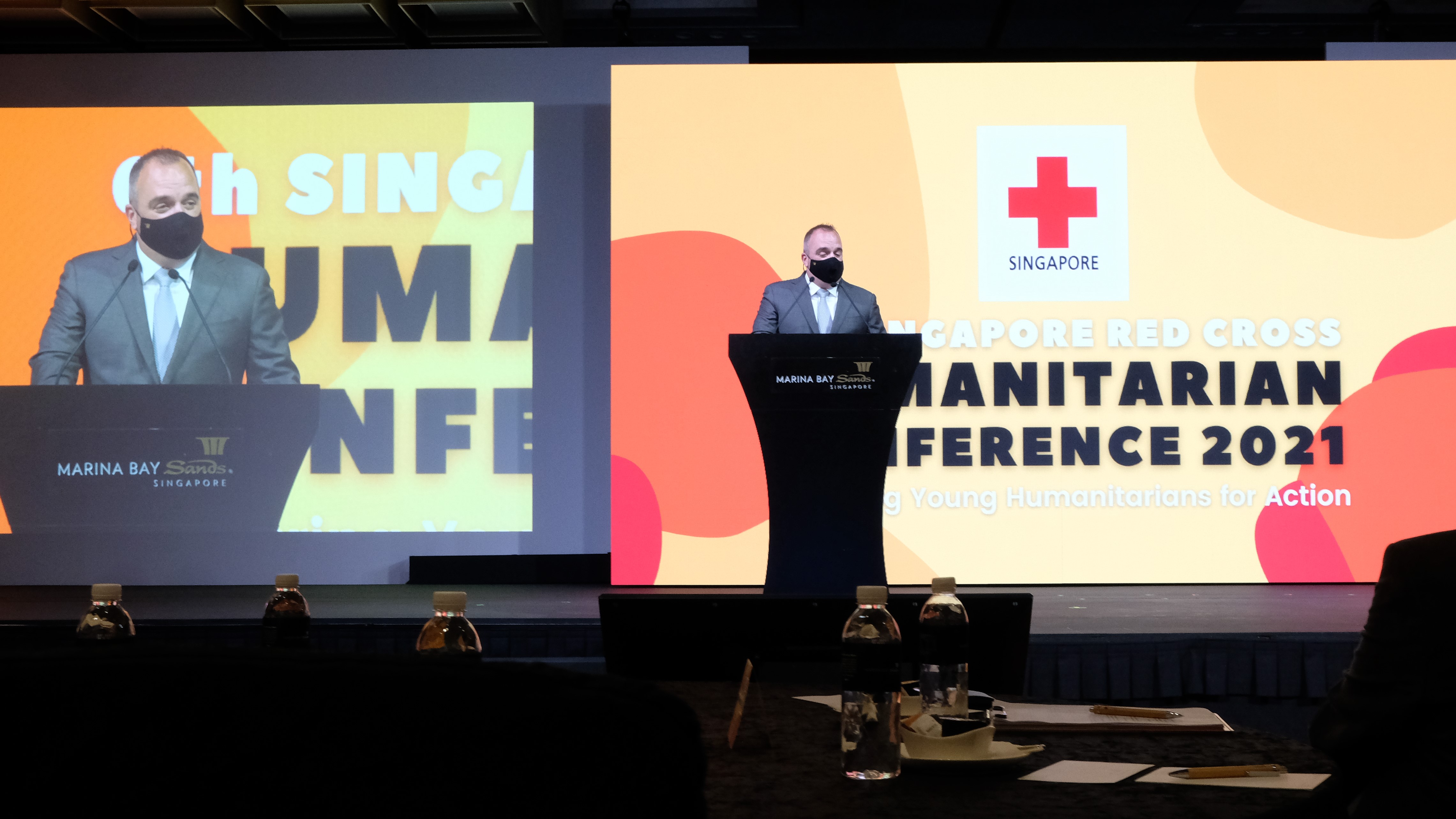
Youth have growth mindsets and are more entrepreneurial
Dr Yang Mee Eng, Executive Director of ASEAN Foundation, shared how youth can leverage the power of technology and innovative practices to make a difference.
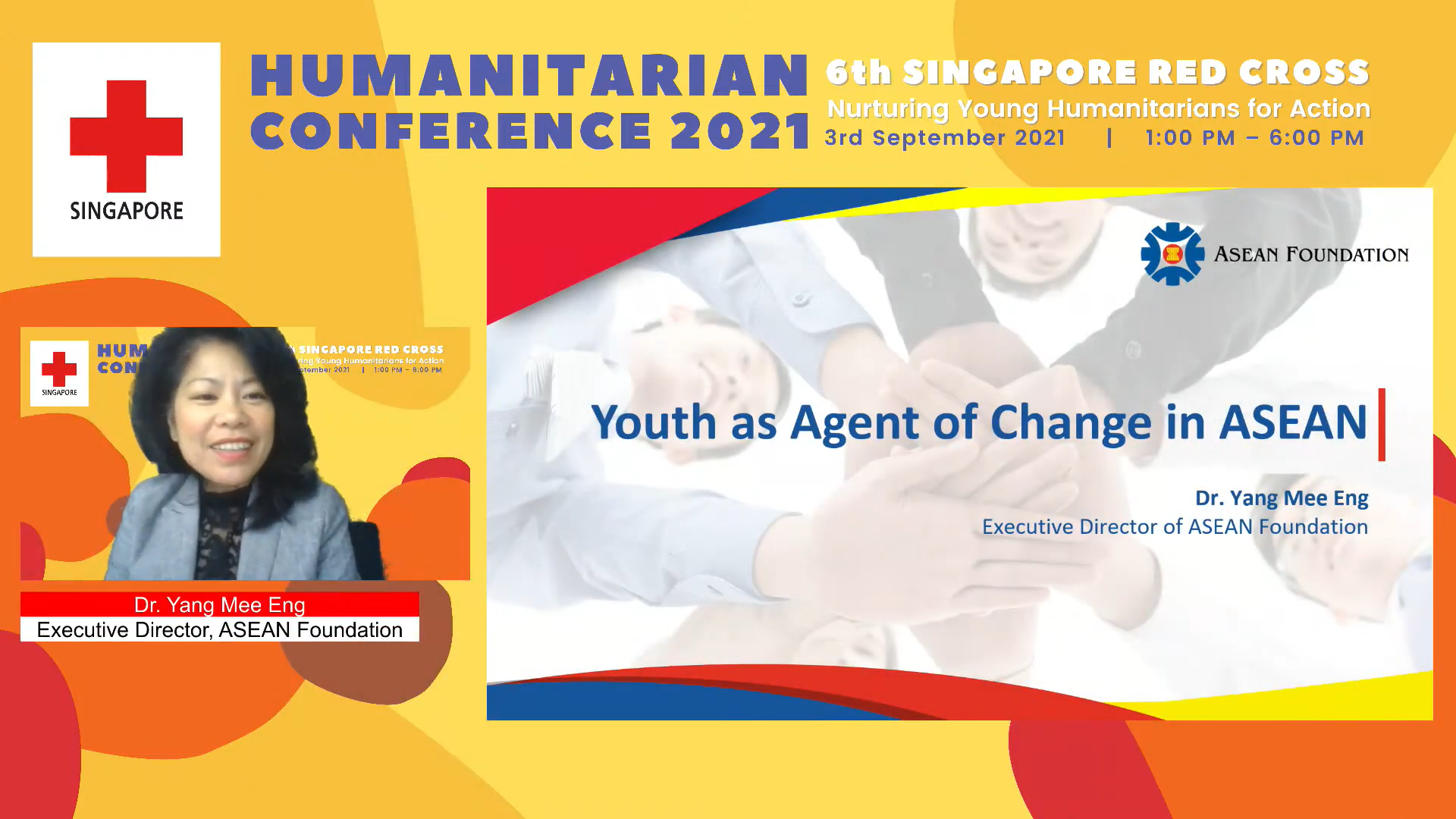
"With growth mindsets, they learn new skills and are interested in continuous learning. Technologically savvy and digitally resilient even during the pandemic, they adapt to new ways and are more entrepreneurial. But youth lacks the professional network, technical skills, access to information and an avenue to showcase their talents. Youth in ASEAN also encounter language barriers...They find it difficult to convey their wants, wishes and opinions. The pandemic has disrupted the educational system. Many schools were closed. Youth do not have many opportunities to network with people. It is more arduous as youth take longer to find decent work. They lack the avenue to showcase their talents and skills virtually. There are amplified vulnerabilities among workers. The pandemic has reduced the productive potential of the entire generation."
"To mitigate the impact of the lost generation, we need to provide free capacity-building opportunities for youth such as mentorship programmes and cross-border virtual internships to empower youth to build their hard and soft skills. There is a need to create a safe space to encourage dialogues and collaboration among youth to give them a platform to voice out their thoughts, concerns and opinions while expanding networking opportunities. Youth understand their culture and are very outspoken; they are not afraid to share their views. Youth leverage their creativity, emotion and cultural intelligence. It is important to promote youth success and give them the recognition they deserve. Highlighting inspiring youth on different platforms will inspire more youth to follow their footsteps. Public, private partnerships are a must. Build skills, give them mentorships."
Check out Dr Yang Mee Eng's presentation.
Importance of Mental Health in Enhancing Community Resilience
Ms Musubi Yata of the Japanese Red Cross Society (JRCS) discussed the importance of mental health in enhancing community resilience. Working in the International Youth Division, Ms Yata engaged youth in a wide range of activities. Prior to the COVID-19 pandemic, JRCS invited youth to Japan to discuss issues related to the ageing society and disaster response.
In her presentation, she expressed appreciation to the Singapore Red Cross for its donation of Personal Protective Equipment (PPEs) and masks, which were distributed to Japan's private hospitals.
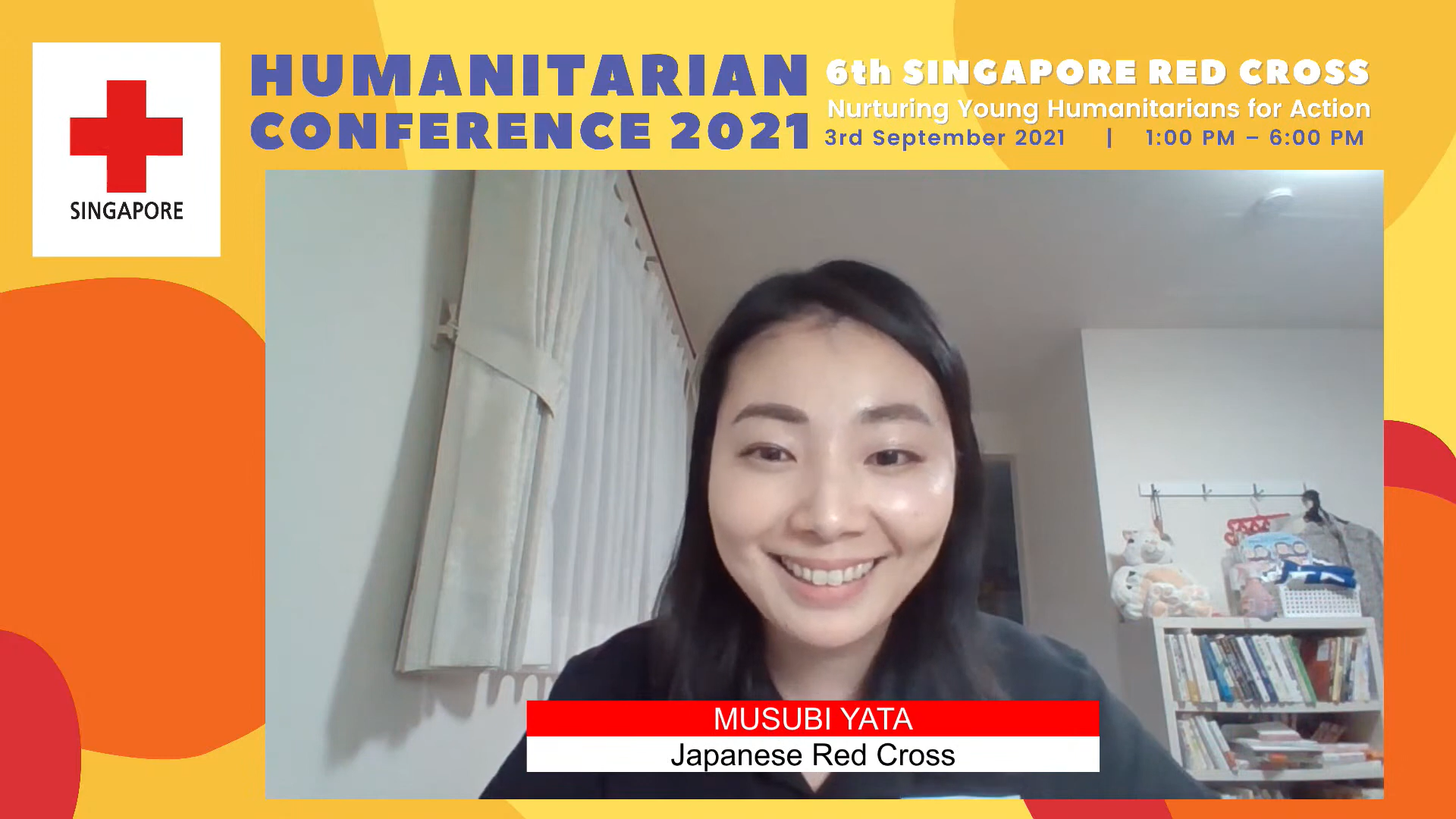
She defined Resilience based on the International Federation of Red Cross and Red Crescent Societies (IFRC) Framework for Community Resilience: "Resilience is the ability of individuals, communities, organisations or countries exposed to disasters, crises and underlying vulnerabilities to anticipate, prepare for, reduce the impact of, cope with and recover from the effects of shocks and stresses without compromising their long-term prospects. The World Health Organisation defines health as a state of complete physical, mental and social well-being and not merely the absence of disease and infirmity. Resilience, well-being and mental health are linked."
Ms Yata shared that in many emergencies, such as natural disasters and conflicts, some people have lost their will to live because of past experiences. She highlighted that in the aftermath of the Great East Japan earthquake and tsunami in 2011, the positive attitude and resilience of the people in Japan was lauded by many foreigners.
"It is important to build resilience in the community among youth. Everyone needs to play a part. Society, schools, and private companies can support the youth. Youth can also learn how they can prevent the negative spiral of behaviour and overcome the situation mentally and psychologically. Youth is the hope of the community and society. Youth can play a role and contribute to society by building resilience in the community. Resilient people will be able to overcome challenges."
Ms Yata advocated the importance of learning Psychological First Aid and urged everyone to get trained with the SRC Academy. Check out her presentation and steps for individuals with mental health issues to follow.
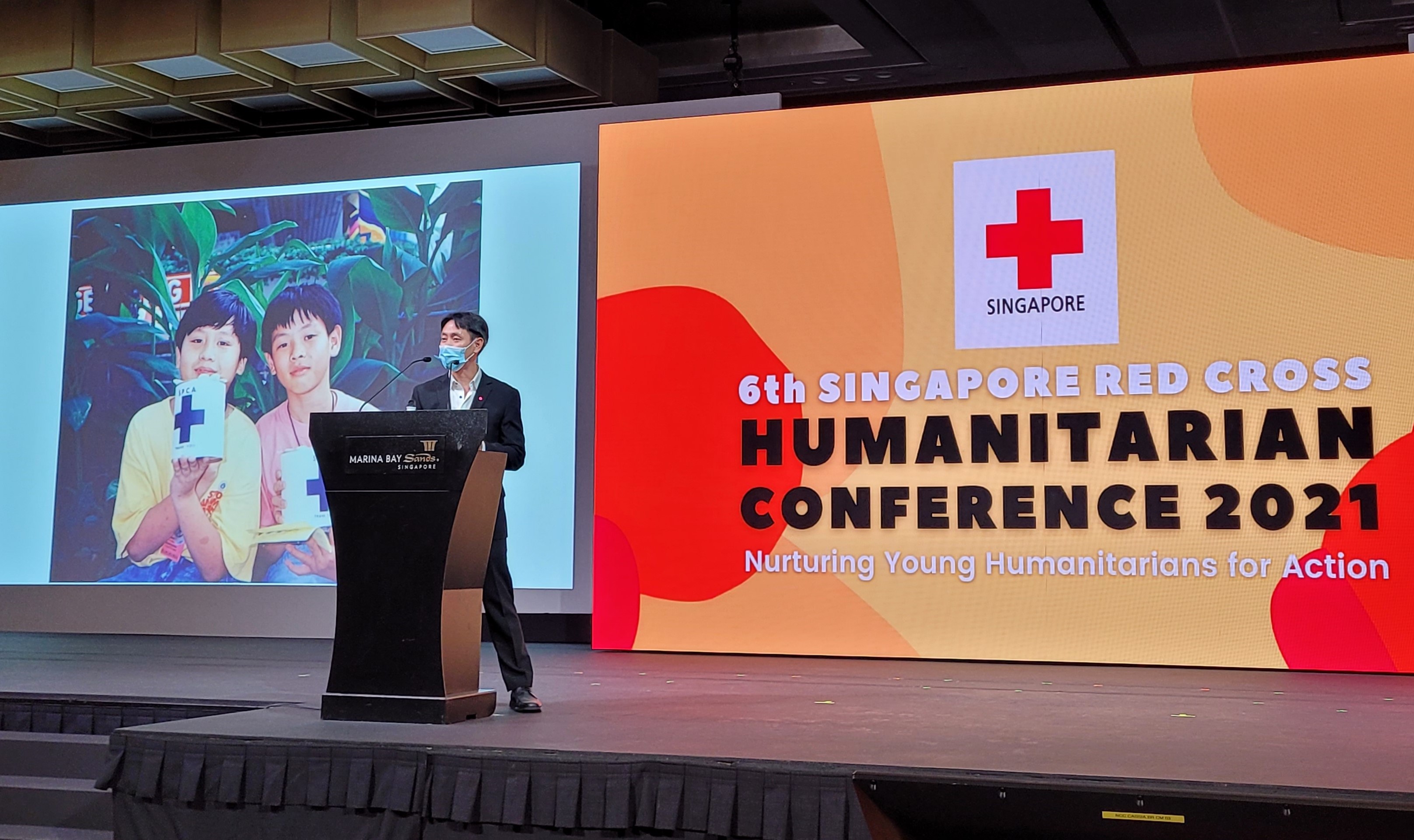
Lastly, Member of Parliament and passionate animal and humanitarian activist Mr Louis Ng shared his life story and how he overcame challenges in his fight for a social cause. His advice: "Never give up. Never take no for an answer. Always put yourself in their shoes, speak up for people in need and push for changes. Confront, collaborate, compromise and be constructive. We want to win the war, not the battle. This is a marathon, not a sprint. Be all three, be an activist, politician, and diplomat. Be an activist to always fight for what is right. Be a politician to do what is right and get enough support to do it. Be a diplomat to maintain good relations with everyone, get everyone to the table and broker win-win solutions to do what is right. Nothing is impossible, miracles take time. Learn from your failures and always bounce back up. Lastly, remember, "I'm only one but still I'm one. I cannot do everything but still I can do something and because I cannot do everything, I will not refuse to do something that I can do".
Humanitarian Innovation Challenge
In conjunction with the Conference, the Singapore Red Cross organised a Humanitarian Innovation Challenge for youth to address society's concerns. Over 10 secondary schools and tertiary institutions submitted 20 submissions.
Prior to the presentations, SRC volunteer Mr Augustine Anthuvan provided a virtual coaching session for the shortlisted teams. 150 volunteers and members provided feedback to the teams after their presentation. The final round of voting was held from 14 to 21 August on Facebook. The top three teams with the highest number of ‘likes’ emerged as the top three winners of the Challenge. These three teams presented their ideas and received their prizes at the Humanitarian Conference:
Champion of the Humanitarian Innovation Challenge
School: Victoria School
Team: Team 1
Students: Isaac Lim, Hee Hong Zhi, Kiatfuangfung Piyaporn, Darren Lee and Ben Ng
Topic: Climate Change
The team highlighted the four reasons for climate change as waste, food, car and transport and deforestation, resulting in rising sea levels, extreme weather conditions, intensifying downpours and wildfires. They initiated a song to inspire people to play a part to mitigate climate change. Check out the presentation.
First Runner Up of the Humanitarian Innovation Challenge
School: Anderson Serangoon Junior College
Students: Yeo Shi En Ashley, Roxanne Tai Pei Ling, Tan Zhuan Jin, Loh Chuan En Colleen, and Charlene Ng Rui Qi
Topic: Blood Donation
The presentation delved into the reasons why people were afraid of donating blood, highlighting that blood donors constituted only 1.8 percent of the residential population. The team adopted a three-pronged approach to advocate blood donation; education, incentives and accessibility. Check out the presentation.
Second runner up of the Humanitarian Innovation Challenge
School: Victoria School
Team: Team 2
Students: Chen Yinqi, Shawn Adams bin Mohamad Rizal, Tan Choon Yu, Zayne, Yanamandra Krishna Kaushik, and Hanns Wong Jen Han
Topic: Blood Donation
The team proposed giving the public the opportunity to tour the blood banks to enhance their understanding of the blood donation process, and to leverage on video and social media platforms to advocate blood donation. Check out the presentation.
Youth Panelists take the stage
Ending the event on a high note, Mr Chong Chen Yang, Co-Chair SEAYN Chair, Malaysian Red Crescent; Ms Debra Lam, Lead of Community Research and Development of Common Ground; Ms Samantha Thien, CEO and founder of Seastainable Co; and Ms Jessica John Posko, Singapore Red Cross volunteer came together for an intriguing and inspiring panel discussion, moderated by Mr Augustine Anthuvan, an SRC volunteer who is also a media consultant and adjunct trainer. They shared their motivations and experiences behind their successes, their views on youth volunteerism and its impact, as well as tips on how to keep going when the going gets tough.
